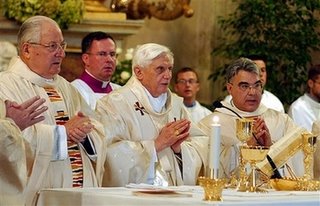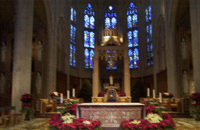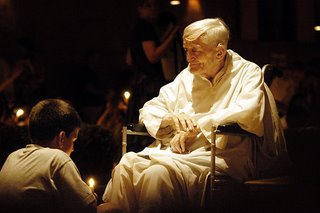The following is Pope Benedict XVI's homily for the Solemnity of the Assumption of Mary on August 15, 2006. I found this on the
Papa Ratzinger Forum.
 Here is a translation of the homily delivered extemporaneously by the Holy Father at the Mass of the Assumption which he celebrated at the St. Thomas of Villanova parish church in Castel Gandolfo yesterday morning.
Here is a translation of the homily delivered extemporaneously by the Holy Father at the Mass of the Assumption which he celebrated at the St. Thomas of Villanova parish church in Castel Gandolfo yesterday morning.
Venerated brothers in the Episcopate and Priesthood,
Dear brothers and sisters!
In the Magnificat - the great song of the Madonna which we heard in the Gospel today - we find a surprising sentence. Mary says: "From this hour on, all generations will call me blessed."
The Mother of the Lord prophesies the Church's Marian praises for all the future, the Marian devotion of the people of God to the end of times.
In praising Mary, the Church has not invented anything "beside" the Scriptures: it has responded to the prophecy made by Mary herself in that moment of grace.
And these words were not simply Mary's own personal words, nor were they arbitrary. Elizabeth, according to St. Luke, had greeted her, filled with the Holy Spirit, crying out: "Blessed is she who believed." And Mary - she, too, filled with the Spirit, continues and completes what Elizabeth says, in declaring "All generations shall call me blessed."
It is a true prophecy, inspired by the Holy Spirit; and the Church, venerating Mary, has responded to the command of the Holy Spirit, it has done what it should do.
We do not praise God enough if we keep silent about his saints, especially about "the Holy One" who became His dwelling on earth, Mary. The simple but multiform Light of God appears to us in all its variety and richness in the face of the saints, who are the true mirrors of His Light.
And in looking on Mary's face, we can see more than by any other way the beauty of God, His goodness, His mercy. In her face we can really see the Divine Light.
"All generations shall call me blessed." We praise Mary, and venerate her, because she is "blessed," and blessed for always. This is the content of the feast we celebrate today. She is blessed because she is united with God, she lives with God and in God.
Our Lord, on the vigil of His Passion, said in bidding farewell to His disciples: "I am going to prepare a dwelling for you in the house of my Father. And in my Father's house are many dwellings."
Mary, in saying,"I am Your handmaid, Thy will be done" prepared on earth a dwelling for God; with body and soul, she became this dwelling, and in this way, she opened the earth to heaven.
St. Luke, in the Gospel we heard today, using other indications, makes us understand that Mary is the true Ark of the Alliance, that the mystery of the Temple - God's indwelling on earth - is fulfilled in Mary.
In Mary, God truly dwelt and became present here on earth. Mary became His shelter. That which all cultures have desired - that God live among us - was realized through her.
St. Augustine said: "Before she conceived God in her body, she already conceived Him in spirit." She gave to the Lord the space of her soul and thus became the true Temple in which God was incarnated, became present on this earth. Thus, being God's dwelling on earth, her own eternal dwelling was already prepared in her, for always.
This is what is contained in the dogma of the Assumption of Mary in body and soul to the glory of the Heavens. Mary is "blessed" because she had become - totally, in body and soul, and forever - the dwelling of God.
If this is so, Mary not only, not simply, invites our admiration and veneration, but guides us, shows the way of life to us, shows us how to become blessed ourselves and find the way to happiness.
Let us listen once more to the words of Elizabeth that are completed in Mary's Magnificat: "Blessed is she who believed." The first and fundamental act to becoming a dwelling of God, and to find happiness thereby, is to believe. Belief is faith, faith in God, that God who showed Himself to us in Jesus Christ and who makes Himself heard in the divine words of Sacred Scripture.
To believe is not to add another opinion to others. And the conviction, the faith that God exists, is not like any other information. Most information, whether true or false, means nothing to us, does not change our life. But if there is no God, life is empty, the future is empty. If God exists, everything changes - life is light, our future is light, we have an orientation for living.
And so, believing is the fundamental orientation of our life. To believe, to say, "Yes, I believe you are God, I believe that in your incarnated Son, You are present among us" orients my life, inspires me to attach myself to God, to unite myself to God and therefore find the place where I should live, the way that I should live.
Believing is not just a kind of thought, an idea. It is, as I have indicated, a way to behave, a way of life. To believe means to follow the path indicated to us by the Word of God.
Mary, beyond her fundamental act of faith, which is an existential act, a stand one takes for life, also says: "His mercy extends to all who fear Him." She speaks, with all of Scripture, of "fear of God." This perhaps a word which we do not all understand or that we do not welcome.
But "fear of god" is not terror - it's something else. As children, we are not terrified of our father, but this "fear of God" is our concern not to destroy the love on which our life is based. Fear of God is that sense of responsibility that we should have, a responsiblity for that portion of earth which is entrusted to us in life. A responsibility for administering well our share of the world and of its history, and thus contribute to building a just world, towards the triumph of good and of peace.
"All generations shall call you blessed". The future, what is to come, belongs to God, it is in the hands of God. God triumphs, not the dragon referred to in the first Reading today, the dragon which represents all the forces of violence in the world.
These forces may seem invincible, but Mary tells us they are not. The Woman - as the First Reading and the Gospel tell us - is stronger because God is stronger. Certainly, compared to the armed dragon, this Woman who is Mary, who is the Church, appears defenseless, vulnerable. And God, too, is really vulnerable in this world, because he is Love, and love is vulnerable. But the future is in His hands - love wins, not hate, so in the end, peace wins.
This then is the great consolation found in the dogma of the Assumption of Mary in body and soul to the glory of heaven. Let us thank the Lord for this consolation, but let us also look on this consolation as a commitment for us to be on the side of good, on the side of peace. And let us pray to Mary, Queen of Peace, that she may help peace to triumph today.
Queen of Peace, pray for us. Amen.
Photo Source:
AP Photo/L'Osservatore Romano
Learn More:
If you are interested in learning more about the Assumption of the Blessed Virgin Mary please consider
purchasing the applicable lesson from CatechismClass.com.


















